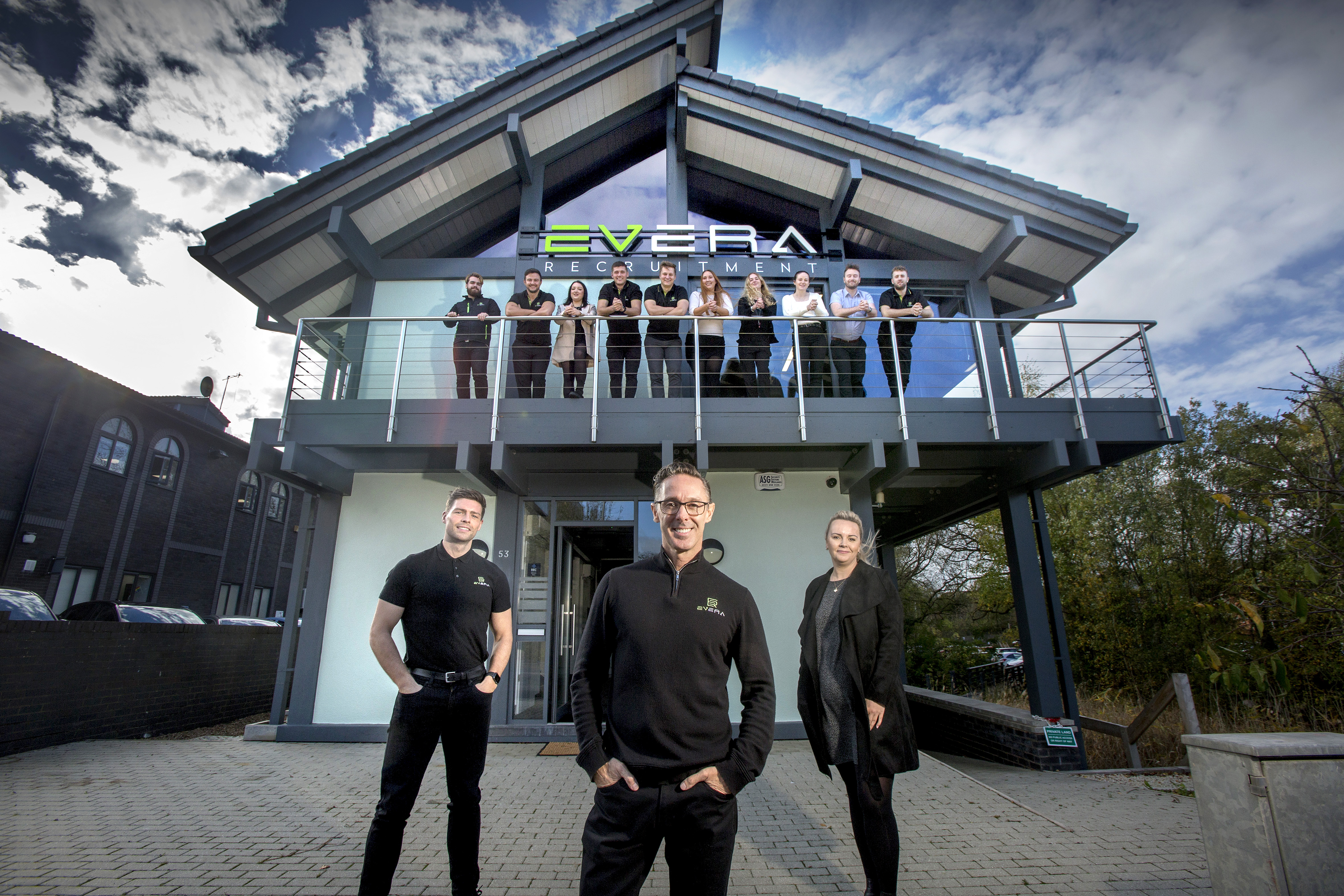Stratford firm that's helping lead the charge towards electric revolution
Steve Doyle, who was born and brought up in Stratford, recently moved his firm EVera into head offices on Timothy’s Bridge Road.

Evera Recruitment CEO Steve Doyle, centre, pictured with his team including Kasia Jendroska, head of delivery, and.Rob Young, associate director. Photo Credit: Mark Williamson
But the choice of location for his new HQ isn’t about nostalgia. He believes south Warwickshire is in the right spot to benefit from thousands of jobs created during the new few years, as the UK opens a string of battery production plants known as ‘gigafactories’.
With a ban on the sale of all new petrol- and diesel-engine cars due to come into force by 2030, sales of electric vehicles (EVs) are rocketing. All these cars need batteries, as do millions of smaller cordless everyday items such as phones, laptops, hair dryers, curling tongs, vacuum cleaners, lawnmowers, drills and hearing aids. Plans are under way to build a gigafactory manufacturing plant at Coventry airport to make the crucial lithium-ion batteries. Once running at full capacity, it will be able to produce up to 60GWh – enough to power 600,000 electric vehicles a year. The project will create up to 6,000 skilled jobs directly plus as many as 18,000-24,000 through companies that supply it. Existing employers such as Jaguar Land Rover and Aston Martin are among those likely to be customers of the new gigafactory.
Steve told the Herald: “Stratford-upon-Avon is the home of Shakespeare and tourism but we’re also smack in the middle of the battery industry here.” Steve, who went to Alcester Grammar School before completing an engineering degree at Nottingham University, explains he’s been recruiting for the battery industry “since before it was cool”.
He said:
We have the ability to find the skills, which a lot of agencies don’t have. That’s why battery companies come to us.”
Typically, EVera is seeking people who either design or engineer the battery cells or battery packs. But sourcing talent to fill roles such as chemists, anode engineers and cathode engineers is tricky when no gigafactories have actually opened in the UK yet.
“When you’re building a gigafactory and you need a load of engineers, you can’t just go and get one from the gigafactory over the road, because it doesn’t exist yet,” Steve pointed out.
His solution is to find the closest match which turns out to be making KitKats, putting soya sauce into sachets, manufacturing pizza bases and stamping sell-by dates on the top of lasagne. He and his team’s super power is having the technical knowledge to spot crossovers with other industries such as food and pharmaceuticals where similar skills are needed.
He explained:
“We refer to it as ‘near neighbour technology’. Within engineering, if you’ve designed something like the screen on a calculator or a solar panel, you’ve probably got a very good idea of how to layer an anode. It’s having that deep technical knowledge of what crosses over. If somebody’s in a factory that makes plastic injection moulded water bottles, that’s probably not going to be of interest to us. But if they’re in a factory that’s printing birthday cards, it could be because the printing processes are actually similar to some of the processes that go into making batteries.”
The company, which was based in Warwick, already has a number of high-profile clients in the battery and battery-related sector including gigafactory company Britishvolt and the Battery Industrialisation Centre (UK BIC) in Coventry, a government-funded technical centre.
Steve worked in engineering companies in Stratford and Redditch before travelling and living in Australia for a few years. On his return he “fell into” the recruitment business where he has spent 25 years specialising in building technical and engineering teams.
He had always dreamed of starting his own agency so when Covid struck, it seemed the perfect moment. As well as headhunting for others, he’s also recruiting for his own agency and is looking to almost double the team from 18 to 30.
EVera’s head office fits the bill for an agency focusing on the renewable energy industry, as it’s an eco-friendly Huf haus with masses of natural light, a wrap-around balcony on three sides of the building and views over woodland.
Pointing out that rechargeable battery (lithium-ion) technology was first developed at Oxford University, he believes the UK still has the scientific and engineering to transform the economy.
“We still have this incredible technology here – we’re also working with a number of smaller companies developing technology that could be game-changers,” he said. “Normally, we’d develop that tech and then it would disappear to China, and they would put it into a factory and then sell it back to us. But we’ve got a real chance now, to take some of that tech and put it straight into our own gigafactories and become world class.”
built by: huzzah!

